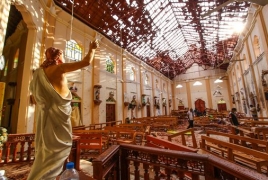Sri Lanka says bombings were in retaliation for New Zealand attacks April 23, 2019 - 14:25 AMT PanARMENIAN.Net - The Easter bombings in Sri Lanka that killed more than 300 people were a response to the recent mass shooting in Christchurch, New Zealand, the defence minister, Ruwan Wijewardene, has said, according to The Guardian. “The preliminary investigations have revealed that what happened in Sri Lanka was in retaliation for the attack against Muslims in Christchurch,” Wijewardene told a special sitting of parliament, referring to the terrorist attack in March in which 50 people were killed. The minister did not present any evidence for his claim. An intelligence memo circulated to some in government in the weeks before the attack noted that one member of the terrorist group named as the perpetrator had started to update his social media accounts “with extremist content” after the New Zealand shootings. But terrorism researchers have said the sophisticated nature of the attack and the equipment used would probably have required months of preparation, including conditioning the suicide bombers and testing the explosives. Wijewardene also told parliament on Tuesday that the death toll had climbed to 321 people – including 38 foreigners – and reiterated that the prime minister and other key officials were never told about the possibility of an impending attack. Sri Lankans have started to bury the dead from the string of bombings.Tuesday has been declared a national day of mourning and white flags were hung from buildings across Colombo as a three-minute silence was held from 8.30am, about the time of the first of Sunday’s bombings that targeted three churches and three luxury hotels. At St Sebastian’s church in Negombo, where at least 110 people are thought to have been killed, more than 20 coffins were brought in for individual services in the run-up to a mass memorial beginning mid-morning. “There are so many bodies that we can’t accommodate them all at once,” Anthony Jayakody, the auxiliary bishop of Colombo, told Agence France-Presse. A few hundred metres away, a palm-lined lot donated to the church had been turned into a mass burial site, where 22 bodies were laid out by 1pm local time. They were marked out by flower arrangements and numbered wooden crosses. “They have died in one place and our hierarchy has decided to bury them in one place,” said Father Sanjeev Senananya, standing by the site. The small, majority-Catholic city was awash with clerics and mourners dressed in white, who walked past rows of leaflets pasted on the walls commemorating victims. The narrow lanes that criss-crossed the area were watched by security forces in camouflage uniforms carrying rifles. “Every second house is having a funeral today,” said a local schoolteacher who gave his name as Amantha. Flags were lowered to half-mast on government buildings, and people bowed their heads but tensions remained high. Bomb disposal squads were called to Kollupitiya railway station in Colombo after an unattended package was found on a train. The US embassy urged people to stay away from the area before the all-clear was given. A state of emergency has been introduced and 40 arrests made, with the second overnight curfew lifting at 4am. Authorities said a total of 192 Azerbaijani troops were killed and 511 were wounded during Azerbaijan’s offensive. In 2023, the Azerbaijani government will increase the country’s defense budget by more than 1.1 billion manats ($650 million). The bill, published on Monday, is designed to "eliminate the shortcomings of an unreasonably broad interpretation of the key concept of "compatriot". The earthquake caused a temporary blackout, damaged many buildings and closed a number of rural roads. Partner news |